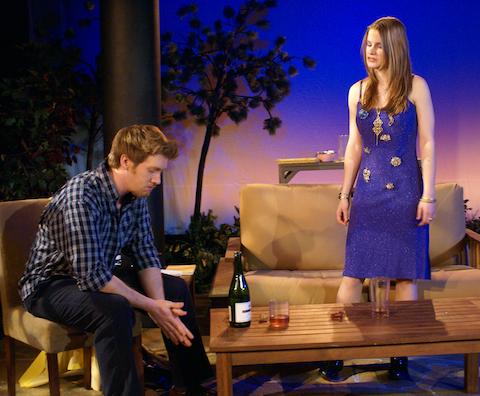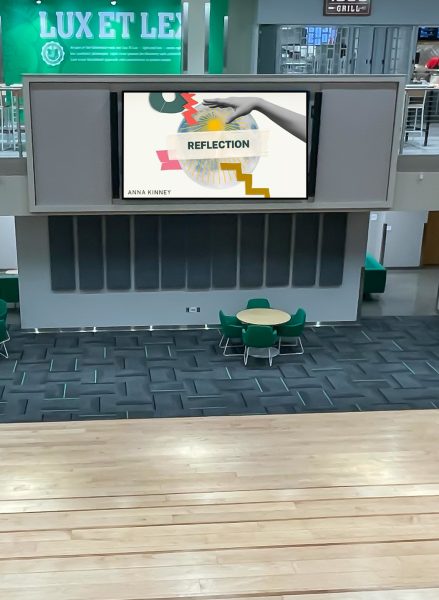Pulitzer winning play performed
UND Theatre Group performs Broadway classic, depicts effects of cancer

UND Theatre students perform a scene from “Shadow Box” on Tuesday night at the Burtness Lab Theatre. Photo courtesy of Brad Reissig.
Most works I’ve seen about cancer lack a depiction of the experience of loved ones.
“The Shadow Box” gives the audience exactly that — the perspectives of loved ones struggling with the devastating affects of illness as much as the actual patient. Having many family members who have had cancer, I found it refreshing to see a brutally honest depiction of the loved ones.
“The Shadow Box” is a play written by actor Michael Cristofer that made its debut on Broadway in 1977. It won the 1977 Pulitzer Prize for Drama and a Tony Award for Best Play.
The play follows three terminal cancer patients awaiting their deaths in separate cottages on a hospital’s grounds. What makes this play so unique is that the characters are seen on three separate stages representing the cottages.
The Burtness Lab Theatre isn’t an ideal spot for this play because the stages are surrounded by the audience. Instead of exiting the stage when a scene changes, the characters stay on the stage with the lights dimmed and remain motionless. This was quite awkward, and I couldn’t help but peek at the motionless characters instead of focusing on the scene I was supposed to be watching.
In Cottage One was cancer patient Joe (Joe Bussey) a reliable, trustworthy and overall good middle-aged guy who just wants to be with his wife Maggie (Claire Wehry) and son Steve (Havard Korsmo) in his final days. Maggie is much more frightened than Joe, as she chatters uncomfortably and avoids the cottage because she wants Joe to go home so things can return to normal. She has not told Steve his father is dying because she can’t come to terms with it herself. Steve has not seen his father in six months and, like Joe, just wants to spend time with his parents, but Maggie’s skewed reality takes that away from him.
Cancer patient Brian (Patrick Frost Pearson) stays in Cottage Two. He is a failed writer who writes and paints to cope with his terminal illness. He turns into a bare essentials sort of guy who despises people who care about superficial things. He can’t stand being helped when his symptoms become unbearable and just wants to do all he can, even the things he doesn’t want to do, while he still has time.
Brian is accompanied by his attractive, young boyfriend Mark (Nick McConnell) who is terrified of the thought of not having Brian anymore. Brian’s overly superficial ex-wife Beverly (Julia Amundson) visits the cottage for a while, stirring up the couples last days together and attempting to recoup her ex-husband emotionally, but she doesn’t understand the idea of disclosure.
In Cottage Three, is Felicity (Trish McGuire), a far-along patient who is down to her last few days. Felicity is a stubborn old woman whose disease has gotten so bad she is suffering from dementia, which caused her to forget that her daughter Claire died long ago. More importantly, her daughter Agnes (Alivia Holkesvig) is with her in the cottage. Agnes is exhausted with her mother’s browbeat attitude but is a painfully devoted to her. She sees her mother is only well when she thinks Claire will come, so Agnes writes letters pretending to be Claire for two years.
When the unseen clinician asks to speak with Agnes, she breaks down asking him why her mother’s death is taking so long because taking care of her mother has put an unbearable strain on her. He tells her it’s her letters she’s been writing that have been giving Felicity an ultimatum to stay alive, and she won’t allow herself to die until Claire comes to see her.
Bussey (Joe), Wehry (Claire) and Holkesvig (Agnes) shined in their performances. Joe and Maggie’s relationship felt painfully real and easy to relate to.
Toward the end, Maggie tells Joe it’s too soon, and she needs him to be around so she can keep her normal routine. Wehry had me tearing up throughout this scene as I thought about my own relationship.
Holkesvig did an outstanding job playing the painfully defenseless Agnes. She looked absolutely exhausted and had the whole trying-to-be-pleasant-even-though-I’m-absolutely-miserable act down impeccably.
I give this play a four out of five stars. It was beautiful, but I was distracted by the motionless characters on stage at times. It was depressing, but that’s what I liked about it.
“The Shadow Box” was more of a work of art than any of the other plays I’ve been to, which were more aimed to entertain.
It is being performed by the UND Theatre students from Feb. 25 to March 1 at 7:30 p.m at the Burtness Lab Theatre. The show costs $5 for students and $12 for non-students.
Adele Kieger is a staff writer for The Dakota Student. She can be reached at [email protected].






